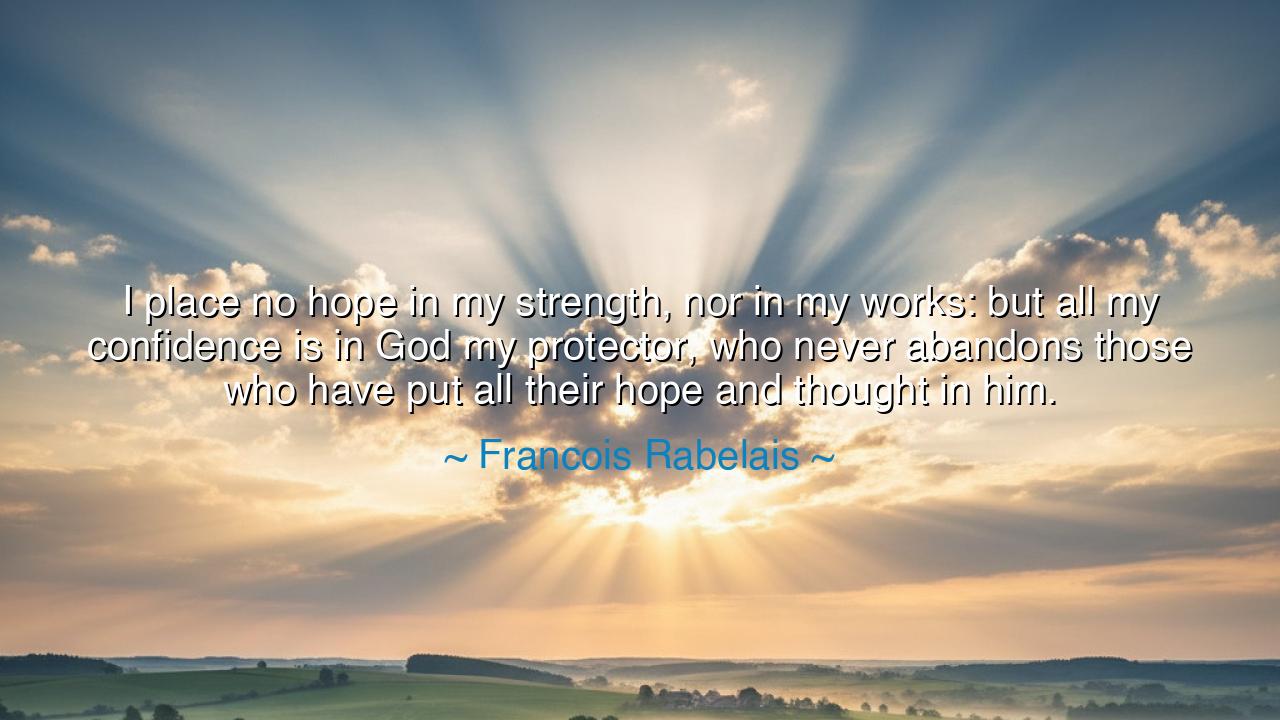
I place no hope in my strength, nor in my works: but all my
I place no hope in my strength, nor in my works: but all my confidence is in God my protector, who never abandons those who have put all their hope and thought in him.






In the timeless words of François Rabelais, the French humanist and sage of the Renaissance, there shines a light that pierces through the illusions of pride and worldly power: “I place no hope in my strength, nor in my works: but all my confidence is in God my protector, who never abandons those who have put all their hope and thought in him.” These words, though born in a time of learning and reason, come from a heart profoundly aware of the limits of human wisdom. Rabelais, who delighted in satire and the study of mankind, speaks here not as a jester of intellect but as a man who has tasted both the sweetness of knowledge and the bitterness of mortality. His statement is not a retreat from reason but a surrender to faith, a recognition that beyond all labor and learning stands the eternal power that upholds creation itself.
In this confession, Rabelais reveals the paradox of human existence — that though we possess strength, it is fragile; though we create works, they are temporary; though we dream of mastery, we remain dust. To “place no hope in my strength” is not to despise human effort, but to understand its boundaries. Man may till the soil, but only heaven sends the rain. Man may build cathedrals and kingdoms, but without grace, even the greatest edifice will crumble. Rabelais’s words are an echo of an older wisdom — the humility of the Psalms, the surrender of Job, the stillness of those who have learned that true security lies not in the self, but in the Source of all things.
The origin of this wisdom lies in Rabelais’s own time — an age of great learning and turmoil. He lived through the Renaissance, when man’s confidence in reason and discovery reached heights unseen since ancient Greece. And yet, amid the celebration of human potential, he saw the shadow of pride creeping into the soul of civilization. War, plague, and religious conflict revealed that intellect alone could not save humanity. It was in this crucible of contradiction that Rabelais wrote these words — not to deny knowledge, but to remind his generation that knowledge without faith is as empty as strength without mercy. He knew that the scholar and the saint must both kneel before the mystery that surpasses understanding.
History gives us countless examples of this truth. Consider the life of Joan of Arc, that young shepherdess who led armies not through strength or strategy, but through unshakable trust in God. She was untrained in war, mocked by kings, and abandoned by allies, yet she marched with a heart aflame with faith. When her earthly protectors betrayed her, she still placed her hope in her heavenly protector — and even in the fire of her martyrdom, her courage did not die. Her story stands as a living testament to Rabelais’s words: that God never abandons those who put all their hope in Him, even when the world turns its face away.
To place all confidence in God is not to abandon action, but to align it with purpose. Rabelais does not teach passivity, but balance. The man of faith works with diligence but does not worship his labor. He fights with courage but does not idolize his power. He studies the stars but remembers who hung them in the heavens. In a world that teaches self-reliance to the point of despair, Rabelais whispers a sacred reminder: You are not alone, and you were never meant to carry the weight of existence by yourself. The burden of the world is too great for human shoulders, but not for divine grace.
In this way, his words are also a call to trust — not the blind trust of ignorance, but the living trust of those who know their limits and choose to stand in faith despite them. When the farmer plants a seed, he trusts the unseen. When the sailor sets his sail, he trusts the wind. When the heart prays, it does the same — surrendering to a strength unseen yet ever-present. Rabelais, a man of intellect and laughter, found his peace not in the noise of reason but in the stillness of dependence upon the divine. For the one who truly trusts is free — free from fear, from pride, from the endless striving that forgets its purpose.
Let this be the lesson to all who hear: do not trust solely in your own strength, for it will fail you in time; do not measure your worth by your works, for they will fade. Instead, root your confidence in the eternal, in that which no failure can touch. Pray not for unbroken power, but for unbroken faith. Let your heart labor, but let it rest also in the certainty that you are held by something greater than your own hands. For the same divine presence that lifted Rabelais beyond fear and folly still waits to lift every soul that calls upon it in humility.
And so, my children, remember the wisdom of François Rabelais: your hope must rest not in what you build, but in who builds through you. Strength fades, works perish, but faith endures. Trust not in the might of man but in the mercy of God, who never abandons those who put their hope in Him. Walk boldly, work diligently, but above all, believe — for it is not by strength that we endure, but by the unseen hand that guides us through every storm.






AAdministratorAdministrator
Welcome, honored guests. Please leave a comment, we will respond soon